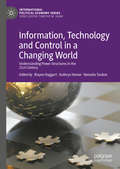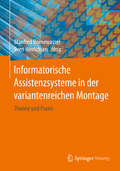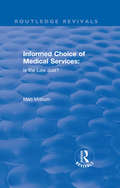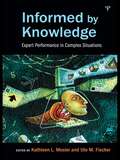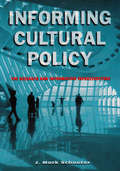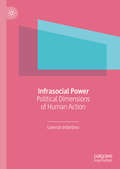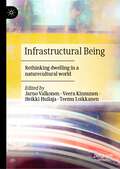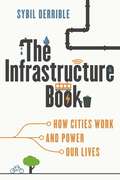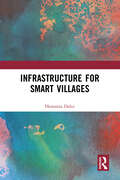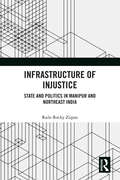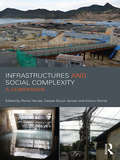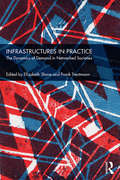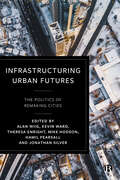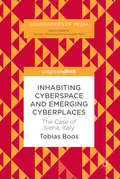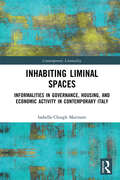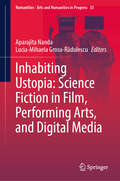- Table View
- List View
Information, Incentives, and Education Policy (The\sanford J. Grossman Lectures In Economics Ser.)
by Derek A. NealHow do we ensure that waste and inefficiency do not undermine the mission of publicly funded schools? Derek Neal writes that economists must analyze education policy in the same way they analyze other procurement problems. Insights from research on incentives and contracts in the private sector point to new approaches that could induce publicly funded educators to provide excellent education, even though taxpayers and parents cannot monitor what happens in the classroom. Information, Incentives, and Education Policy introduces readers to what economists know—and do not know—about the logjams created by misinformation and disincentives in education. Examining a range of policy agendas, from assessment-based accountability and centralized school assignments to charter schools and voucher systems, Neal demonstrates where these programs have been successful, where they have failed, and why. The details clearly matter: there is no quick-and-easy fix for education policy. By combining elements from various approaches, economists can help policy makers design optimal reforms. Information, Incentives, and Education Policy is organized to show readers how standard tools from economics research on information and incentives speak directly to some of the most crucial issues in education today. In addition to providing an overview of the pluses and minuses of particular programs, each chapter includes a series of exercises that allow students of economics to work through the mathematics for themselves or with an instructor’s assistance. For those who wish to master the models and tools that economists of education should use in their work, there is no better resource available.
Information, Technology and Control in a Changing World: Understanding Power Structures in the 21st Century (International Political Economy Series)
by Blayne Haggart Natasha Tusikov Kathryn HenneThis book explores the interconnected ways in which the control of knowledge has become central to the exercise of political, economic, and social power. Building on the work of International Political Economy scholar Susan Strange, this multidisciplinary volume features experts from political science, anthropology, law, criminology, women’s and gender studies, and Science and Technology Studies, who consider how the control of knowledge is shaping our everyday lives. From “weaponised copyright” as a censorship tool, to the battle over control of the internet’s “guts,” to the effects of state surveillance at the Mexico–U.S. border, this book offers a coherent way to understand the nature of power in the twenty-first century.
Informatorische Assistenzsysteme in der variantenreichen Montage: Theorie und Praxis
by Manfred Bornewasser Sven HinrichsenIn diesem Buch werden die Herausforderungen bei der Einführung von informatorischen Assistenzsystemen in der Montage erörtert und umfangreiche Gestaltungsempfehlungen vermittelt.Die industrielle Montage ist in Deutschland nach wie vor von hoher volkswirtschaftlicher Bedeutung. In der Industrie existieren zehntausende Montagearbeitsplätze. Diese verändern sich. Infolge hoher Wettbewerbsintensität und Innovationsdynamik entstehen immer mehr Produktvarianten, die zu einer Zunahme der Komplexität der Montagearbeit beitragen. Es stellt sich daher die Frage, wie mit dieser gestiegenen Komplexität umzugehen und wie diese seitens der Beschäftigten zu bewältigen ist, ohne dass es zu Überbeanspruchungen und einem Verfehlen von Produktivitätszielen kommt. Während Montage bislang vornehmlich als energetische Arbeit begriffen wurde, rücken künftig die kognitiven Anteile der Montagearbeit in den Vordergrund. In diesem Zusammenhang kommt dem Komplexitäts- und Informationsmanagement eine entscheidende Rolle zu: Während früher Strategien des Vereinfachens, z. B. durch fortschreitende Arbeitsteilung, im Vordergrund standen, gewinnen heute Strategien des Beherrschens der Komplexität an Bedeutung. Im Zentrum dieses Paradigmenwechsels stehen informatorische Assistenzsysteme, die den Beschäftigten im Montageprozess mit Informationsangeboten unterstützen und so die wachsende Komplexität sicher beherrschbar machen.
Informed Choice of Medical Services: Is The Law Just? (Routledge Revivals)
by Marj MilburnThis title was first published in 2001. This work is a uniquely multi-disciplinary contribution to the existing bioethical literature on the topic of informed choice of medical services. It is also the first comprehensive bioethical text to confront the central issue of power in the clinical encounter and to argue for statutory protection of the right to informed choice. While the majority of bioethicists argue for a conciliatory, rather than adversarial, approach to the chronic problem of uninformed consent, the author of this work argues that the external regulation of medicine is essential if the right to informed choice is to be protected. This argument is based upon an extensive review of the bioethical, legal, political, medical, sociological and philosophical literature, as well as a wide range of empirical and anecdotal evidence, evolving from a detailed exploration of power and the limits of rationality in the clinical encounter.
Informed by Knowledge: Expert Performance in Complex Situations (Expertise: Research and Applications Series)
by Kathleen L. Mosier Ute M. FischerThe focus of this book is on how experts adapt to complexity, synthesize and interpret information in context, and transform or "fuse" disparate items of information into coherent knowledge. The chapters examine these processes across experts (e.g. global leaders, individuals in extreme environments, managers, police officers, pilots, commanders, doctors, inventors), across contexts (e.g. space and space analogs, corporate organizations, command and control, crisis and crowd management, air traffic control, the operating room, product development), and for both individual and team performance. Successful information integration is a key factor in the success of diverse endeavors, including team attempts to climb Mt. Everest, crowd control in the Middle East, and remote drilling operations. This volume is divided into four sections, each with a specific focus on an area of expert performance, resulting in a text that covers a wide range of useful information. These sections present well-researched discussions, such as: the management of complex situations in various fields and decision contexts; technological and training approaches to facilitate knowledge management by individual experts and expert teams; new or neglected perspectives in expert decision making; and the importance of ‘modeling’ expert performance through techniques and frameworks such as Cognitive Task Analysis, computational architectures based on the notion of causal belief mapping such as ‘Convince Me,’ or the data/frame model of sensemaking. The volume provides essential reading for researchers and practitioners of Naturalistic Decision Making and those who study Expertise; Organizational and Cognitive Psychologists; and researchers and students in Business and Engineering.
Informing Cultural Policy: The Information and Research Infrastructure
by J. Mark SchusterIn any policy arena, the crafting of effective policy depends on the quality of the information infrastructure that is available to the participants in that arena. Such an information infrastructure is designed, developed, and managed as a critical element in policy formulation and implementation. While various attempts have been made to map the extent of the existing cultural policy information infrastructure in the United States, no structured attempt has been made to conduct a cross-national analysis intended to draw on the more highly developed models already in operation elsewhere.A cross-national comparative look provides valuable information on how this infrastructure has evolved, on what has succeeded and what has had less success, on what is sustainable and what is not, and on how the range of interests of the various individuals and institutions involved in the cultural policy arena can best be accommodated through careful design of the information infrastructure.In Informing Cultural Policy, international cultural policy scholar and researcher J. Mark Schuster relates the findings of a study that took him from North America to Europe to gain understanding of the cultural policy information infrastructure in place abroad. His findings are structured into a taxonomy that organizes the array of research and information models operating throughout the world into a logical framework for understanding how the myriad cultural agencies collect, analyze, and disseminate cultural policy data. Schuster discusses private- and public-sector models, including research divisions of government cultural funding agencies, national statistics agencies, independent nonprofit research institutes, government-designated university-based research centers, private consulting firms, cultural ""observatories,"" non-institutional networks, research programs, and publications. For each case study undertaken, the author provides the Internet address, names, and information for key conta
Infractions: Rule Violations, Unethical Conduct, and Enforcement in the NCAA
by Jerry ParkinsonJerry Parkinson spent nearly ten years, from 2000 to 2010, as a member of the NCAA’s Division I Committee on Infractions, participating in over one hundred major infractions cases. He came away from that experience—and the experience of reading extensive commentary on infractions cases—with the conviction that most observers do not understand the NCAA’s rules-enforcement process, despite the amount of public attention many major cases receive. Parkinson uses his insider’s perspective, along with illustrative stories, to help readers understand how the NCAA’s rules-enforcement process really works. These stories include: a university board of trustees chair committing suicide over an infractions case; a pay-for-play scandal leading directly to the state’s governor; a head coach falsely portraying a deceased player as a drug dealer to cover up the coach’s own misconduct; a gambler laundering his money by making the largest booster payments in NCAA history; and a coach’s sexual abuse of children leading to some of the harshest sanctions ever imposed by the NCAA. Based on years of experience and infused with insight, Parkinson provides a broad view of the world of NCAA rule breakers and the NCAA rules-enforcement process.
Infrapolitical Passages: Global Turmoil, Narco-Accumulation, and the Post-Sovereign State
by Gareth WilliamsThis book makes a case for infrapolitics as an enactment of intellectual responsibility in the face of a tumultuous world of war and of technological value extraction on a planetary scale. Infrapolitical Passages proposes to clear a way through some of the dominant political determinations and violent symptoms of contemporary globalization. In doing so, Gareth Williams makes a case for infrapolitics as an enactment of intellectual responsibility in the face of a tumultuous world of war and of technological value extraction on a planetary scale. The book offers a theory of globalization as a gigantic, directionless crisis in humanity’s symbolic organization, as well as a theory of global economic warfare as the very positing of directionlessness and, at the same time, facticity. Williams’s infrapolitics stands at a distance from the biopolitical, which it understands as domination presenting itself as the production of specific forms of subjectivity in the face of the commodity. The subsequent obscuring of being signals the need to circumvent the instrumentalization of life as subordination to the metaphysics of subjectivity, representation, and politics. Infrapolitical Passages works to confront that which is unavailable in subjectivity and representation, opening a way for facticity in the age of globalization in order to make room for the infrapolitical question for existence.
Infrapolitics: A Handbook
by Alberto MoreirasThe personal is not political, even if politics marks it and, in many cases, determines it. Infrapolitics seeks to understand conditions of existence that are not reducible to political life and that exceed any definition of world bound to political determinations. It seeks to mobilize an exteriority without which politics could only be business or administration, that is, oppression. It demands a change in seeing and an everyday practice that subtracts from political totalization in the name of a new production of desire, of a new emancipation, and of a conception of experience that can breach the general captivation of life.In this book, Alberto Moreiras describes a form of thought aiming to provide content for a form of life and to offer a new theoretical practice for concrete existence. The book provides a genealogy of the notion of infrapolitics and places it within contemporary philosophical reflection, examining its deployment in the wake of postphenomenology and deconstruction, Lacanian analysis, the principle of anarchy, and an egalitarian symbolization of social life. In doing so, Moreiras elaborates Infrapolitics as both a general critique of the political apparatus and as an imperative horizon for existential self-understanding.
Infrasocial Power: Political Dimensions of Human Action
by Lorenzo InfantinoBuilding from the level of individual interaction, this book intends to shed light on what the author terms "infrasocial power" and the relation between this individual-actor oriented level and public power. In overviewing the origins of power, the author allows for the disaggregation of the social fabric, thus making it possible to: 1) isolate the “sequence” in which the phenomenon of superordination and subordination materialises; 2) identify the institutional “instruments” which can be used to limit infrasocial power; 3) discriminate between a social position achieved through engagement with others (and what we are capable of doing for them) from one occupied by means of force and deception; 4) explain the birth and function of public power; and 5) analyze the consequences produced by different political regimes.
Infrastructural Being: Rethinking dwelling in a naturecultural world
by Jarno Valkonen Veera Kinnunen Heikki Huilaja Teemu LoikkanenThis book provides a comprehensive insight into the contemporary naturecultural world by exploring infrastructures through the dwelling approach. The notion of naturecultures has been utilized in environmental humanities and social sciences to emphasize the inherent messiness of the lived world and the inseparability of social and biophysical elements. Concept of naturecultures stresses that seemingly “natural” is always simultaneously “cultural” and vice versa. This approach allows fleshing out the messy engagements with infrastructures, which in this book is conceptualized as infrastructural being. This book is a contribution to emerging discussions on infrastructures in the fields of environmental social sciences and humanities. It sensitizes to the peculiarities of modern dwelling and modern, yet often overlooked, ways of being connected with nature. Moreover, it provides tools for speculating, how could things be otherwise. The book is a topical response to the urgent call for developing new forms of human-nature relations in times of environmental turbulence.
Infrastructure Book: How Cities Work and Power Our Lives
by Sybil Derrible&“[A] penetrating analysis of urban infrastructure…&” —NatureClean water, paved roads, public transit, electricity and gas, sewers, waste processing, telecommunication, even the Internet – all this infrastructure is what makes cities work and powers our lives, often seamlessly and silently. Virtually everything we do and consume depends on infrastructure. Yet, most people have little to no idea how these systems work. How is water treated? How do cities manage rainwater? Why do traffic jams exist? How is electricity generated and distributed? What happens to trash after it is picked up? How does the Internet work?In The Infrastructure Book, world-renowned urban engineering expert Sybil Derrible reveals the behind-the-scenes machinations of the foundational systems that make our societies function. Visiting sixteen cities around the world and their unique approaches to organizational challenges – from water distribution in Hong Kong to waste management in Tokyo, and from Chicago&’s power grid to low Earth orbit satellites in space – this highly readable book uses fascinating case studies and historical detours to show how infrastructure works – and, sometimes, doesn&’t.With large-scale infrastructure repairs looming and the need for existing infrastructure to be transformed, the book also shows how infrastructure can be more sustainable and resilient. After reading The Infrastructure Book, readers will never look at a city the same way.
Infrastructure for Smart Villages
by Hemanta DoloiThis book intends to initiate a fresh articulation of need-based infrastructure provisions in rural contexts. Departing from the conventional theories and practices of infrastructure planning and development applied in urban settings, the book presents a comprehensive suite of technical and non-technical indicators that rationalise fit-for-purpose planning, development, and operations of rural infrastructure. Drawing from global practices in public and private sectors and research-based evidence, a distinctive argument is put forward for promoting location-specific infrastructure development from effectiveness, practicality, affordability, and sustainability perspectives. The argument encompasses wider social, cultural, and economic contexts that are unique to rural settings and the book highlights a clear roadmap of how the UN’s sustainable development goals (SDGs) are at the core of developing rural communities with necessary infrastructure provisions that are purpose-built, affordable, risk averse, and resilient.This book will provide an overview of some of the little-understood and sometimes counter-intuitive best practices on rural infrastructure and value-based priorities that have emerged in uplifting rural communities in developing economies over the last 30 years. Drawing from the global literature and practice-based evidence across a complete spectrum of relevant disciplines, this book will provide readers with a clear articulation of the innovative ideas around harnessing rural potential, and empowering rural communities with added support in growth and progressive development in the context of interconnected infrastructure systems and improved living standards. It is key reading for development, planning, and infrastructure courses as well as professionals and researchers involved in international development, aid, and provision in rural areas.
Infrastructure of Injustice: State and Politics in Manipur and Northeast India
by Raile Rocky ZiipaoThis book examines the dynamics of infrastructure development in Northeast India especially Manipur from a socio-anthropological perspective. It looks at the pattern and distribution of infrastructure in the region to analyse the impact of education, roads and healthcare on the livelihoods, ecosystems, governance, and social futures of communities. The volume examines the infrastructure deficit in the conflict-ridden state of Manipur, focusing especially on electricity and roads. The author shows how problems arising from poor infrastructure are further complicated on account of corruption, insurgency, ethnic unrest and the politics of marginalization. Looking at the discourse around development in the Northeast, the volume also highlights the structural inequality in Manipur and other states. It further shows how infrastructure development can become a means for enabling trade, creating markets, diluting boundaries between varied ethnic groups and connecting people. This book will be useful for researchers and scholars of development studies, economics, social anthropology, sociology and public policy; particularly those interested in India’s Northeast.
Infrastructure, Wellbeing and the Measurement of Happiness
by Roe Jenny Seaman Kate Mahmoudi HodaThis book takes an interdisciplinary approach to our understanding of infrastructure, and it’s influence on happiness and wellbeing, by examining the concept from economic, human development, architectural, urban planning, psychological, and ethical points of view. Providing insights from both research and practice the volume discusses how to develop happier cities and improve urban infrastructure for the wellbeing of the whole population. The book puts forth the argument that it is only in understanding the true nature of infrastructure’s reach – how it connects, supports, and enlivens human beings – that we can truly begin to understand infrastructure’s possibilities. It connects infrastructure to that most elusive of human qualities – happiness – examining the way infrastructure is fundamentally tied to human values and human well-being. The book seeks to suggest novel approaches, identify outmoded undertakings, and define new possibilities in order to maximize infrastructure’s impact for all people – with a focus on diversity, inclusion and equity. In seeking to define infrastructure broadly and examine its possibilities systematically this book brings together theory and evidence from multiple disciplinary perspectives including, sociology, urban studies, architecture, economics, and public health in order to advance a startling claim – that our lives, and the lives of others, can be substantively improved by greater adhesion to the principles and practices of infrastructure design for happiness and wellbeing.
Infrastructures and Social Complexity: A Companion (CRESC)
by Casper Bruun Jensen Atsuro Morita Penelope HarveyContemporary forms of infrastructural development herald alternative futures through their incorporation of digital technologies, mobile capital, international politics and the promises and fears of enhanced connectivity. In tandem with increasing concerns about climate change and the anthropocene, there is further an urgency around contemporary infrastructural provision: a concern about its fragility, and an awareness that these connective, relational systems significantly shape both local and planetary futures in ways that we need to understand more clearly. Offering a rich set of empirically detailed and conceptually sophisticated studies of infrastructural systems and experiments, present and past, contributors to this volume address both the transformative potential of infrastructural systems and their stasis. Covering infrastructural figures; their ontologies, epistemologies, classifications and politics, and spanning development, urban, energy, environmental and information infrastructures, the chapters explore both the promises and failures of infrastructure. Tracing the experimental histories of a wide range of infrastructures and documenting their variable outcomes, the volume offers a unique set of analytical perspectives on contemporary infrastructural complications. These studies bring a systematic empirical and analytical attention to human worlds as they intersect with more-than-human worlds, whether technological or biological.
Infrastructures in Practice: The Dynamics of Demand in Networked Societies
by Elizabeth Shove Frank TrentmannInfrastructures in Practice shows how infrastructures and daily life shape each other. Power grids, roads and broadband make modern lifestyles possible – at the same time, their design and day-to-day operation depends on what people do at home and at work. This volume investigates the entanglement of supply and demand. It explains how standards and 'normal' ways of living have changed over time and how infrastructures have changed with them. Studies of grid expansion and disruption, heating systems, the internet, urban planning and office standards, smart meters and demand management reveal this dynamic interdependence. This is the first book to examine the interdependence between infrastructures and the practices of daily life. It offers an analysis of how new technologies, lifestyles and standards become normalised and fall out of use. It brings together diverse disciplines – history, sociology, science studies – to develop social theories and accounts of how infrastructures and practices constitute each other at different scales and over time. It shows how networks and demands are steered and shaped, and how social and political visions are woven into infrastructures, past, present and future. Original, wide-ranging and theoretically informed, this book puts the many practices of daily life back into the study of infrastructures. The result is a fresh understanding of how resource-intensive forms of consumption and energy demand have come about and what is needed to move towards a more sustainable lower carbon future.
Infrastructuring Urban Futures: The Politics of Remaking Cities
by Alan Wiig, Kevin Ward, Theresa Enright, Mike Hodson, Hamil Pearsall and Jonathan SilverEPDF and EPUB available Open Access under CC-BY-NC-ND licence. Focusing on material and social forms of infrastructure, this edited collection draws on rich empirical details from cities across the global North and South. The book asks the reader to think through the different ways in which infrastructure comes to be present in cities and its co-constitutive relationships with urban inhabitants and wider processes of urbanization. Considering the climate emergency, economic transformation, public health crises and racialized inequality, the book argues that paying attention to infrastructures’ past, present and future allows us to understand and respond to the current urban condition.
Infusing Equity and Cultural Competence into Teacher Development
by Aaron Thompson Joseph B. CuseoAs teachers face increasing diversity within their classrooms in learning styles, race, linguistics, and culture, the academic rigor needed to successfully enter college or a career will require them to evolve in order for all students to succeed. <p><p> Infusing Diversity & Cultural Competence into Teacher Education provides educators and future educators with pathways for achieving cultural competence. Placing this crucial competence in the teacher’s toolbox will increase their opportunity and the capacity of ensuring success in and out of the classroom. The tools presented in this book assist the teacher in making gains in closing achievement gaps, building opportunity for all students, building strong pedagogical skills, enhancing curriculum for their diverse students, and constantly assessing all of these areas to ensure they are maintaining their status as the largest contributor to students’ success. <p><p> Infusing Diversity & Cultural Competence into Teacher Education: <p> Defines, describes, and explains why diversity should be part of the formal education process <p>Illustrates student, family, school, and community roles in the learning process. <p>Describes how to incorporate intercultural communication and relationship building skills into curriculum.
Ingenious Citizenship: Recrafting Democracy for Social Change
by Charles T. LeeIn Ingenious Citizenship Charles T. Lee centers the daily experiences and actions of migrant domestic workers, sex workers, transgender people, and suicide bombers in his rethinking of mainstream models of social change. Bridging cultural and political theory with analyses of film, literature, and ethnographic sources, Lee shows how these abject populations find ingenious and improvisational ways to disrupt and appropriate practices of liberal citizenship. When voting and other forms of civic engagement are unavailable or ineffective, the subversive acts of a domestic worker breaking a dish or a prostitute using the strategies and language of an entrepreneur challenge the accepted norms of political action. Taken to the extreme, a young Palestinian woman blowing herself up in a Jerusalem supermarket questions two of liberal citizenship's most cherished values: life and liberty. Using these examples to critically reinterpret political agency, citizenship practices, and social transformation, Lee reveals the limits of organizing change around a human rights discourse. Moreover, his subjects offer crucial lessons in how to turn even the worst conditions and the most unstable positions in society into footholds for transformative and democratic agency.
Ingenious Principles of Nature: Do We Reckon With Nature Or Nature Reckons With Us
by E. W. KüppersThis volume focuses on practical applications of the principles that can be transferred from nature to our design space. It is thereby supported by the regulation and control systems as described by the science of cybernetics.
Inhabiting Cyberspace and Emerging Cyberplaces
by Tobias BoosThis book explores the concept of cyberplace as a mode of inhabiting the contemporary world. As a result, it suggests that, for many communities, unlocking cyberspace and inhabiting cyberplaces is now an integral part of their coming-to-the-globalised-world. Boos reviews in the detail the existing academic literature from cultural anthropology, human geography, and sociology on "cyberspace", concluding that a phenomenological perspective on cyberspace provides the possibility of gaining a deep understanding of our contemporary lifeworlds, in which on- and offline practices constantly intermingle. In four chapters, he applies the developed theoretical and methodological approaches to the case of Siena's neighbourhoods, the contrade, analysing their websites and discussing the implications of his findings for understanding contemporary processes of community building and for future research on cyberspace. This concise and accessible book will be of interest to advanced students and scholars in cultural anthropology, human geography, media studies and sociology.
Inhabiting Liminal Spaces: Informalities in Governance, Housing, and Economic Activity in Contemporary Italy (Contemporary Liminality)
by Isabella Clough MarinaroThis book draws together debates from two burgeoning fields, liminality and informality studies, to analyze how dynamics of rule-bending take shape in Rome today. Adopting a multiscalar and transdisciplinary approach, it unpacks how gaps and contradictions in institutional rulemaking and application force many residents into protracted liminal states marked by intense vulnerability. By merging a political economy lens with ethnographic research in informal housing, illegal moneylending, unauthorized street-vending and waste collection, the author shows that informalities are not marginal or anomalous conditions, but an integral element of the city’s governance logics. Multiple actors together construct the local cultural norms, conventions and moral economies through which rule-negotiation occurs. However, these practices are ultimately unable to reconfigure historically rooted power dynamics and hierarchies. In fact, they often aggravate weak urbanites’ difficulties in accessing rights and services. A study that challenges assumptions that informalities are predominantly features of developing economies or limited to specific groups and sectors, this volume’s critical approach and innovative methodology will appeal to scholars of sociology and anthropology interested in social theory, urban studies and liminality.
Inhabiting Silence: An Anthropologist in the Cloister (European Anthropology in Translation)
by Francesca SbardellaMonasteries are typically characterized by physical and symbolic limitations on access as they are usually known through written texts and accounts by nuns who live in that world but do not allow others to have access. This has often resulted in research based on indirect sources. This volume is the result of observant participation in which the ethnographer is a protagonist social actor in two French monasteries of Discalced Carmelite nuns. The author experiences and narrates details of their everyday life that usually remain unseen but contribute to shaping community-building processes and, at the same time, construe the religious woman.
Inhabiting Ustopia: Science Fiction in Film, Performing Arts, and Digital Media (Numanities - Arts and Humanities in Progress #33)
by Lucia-Mihaela Grosu-Rădulescu Aparajita NandaThis volume contributes to research in both humanities and performing arts without disregarding the more recent digital artistic media by focusing on works of science fiction (Sci-Fi). The book's structure mirrors the themes approached in an effort to contextualize the Atwoodian concept of 'ustopia' by addressing a variety of topical subjects, such as transhumanism, ethical dilemmas, subjectivities in a digital world, in science fiction theater, opera, and art installations as well as film and new digital media. The book collects interpretations of transmedial performances, comparisons of films and novels, videogames, and other immersive platforms. The contributors include a range of academics and specialists from Japan, Romania, India, Spain, Ireland, and the U.S.A. Recent preoccupations with Artificial Intelligence and its advantages and threats have also meant a re-assessment of Sci-Fi creations and their relevance. The book appeals to students and researchers in the humanities, media studies, performance arts, as well as larger audiences interested in comparative and analytic discussions of Sci-Fi works anchored in real-life concerns.

